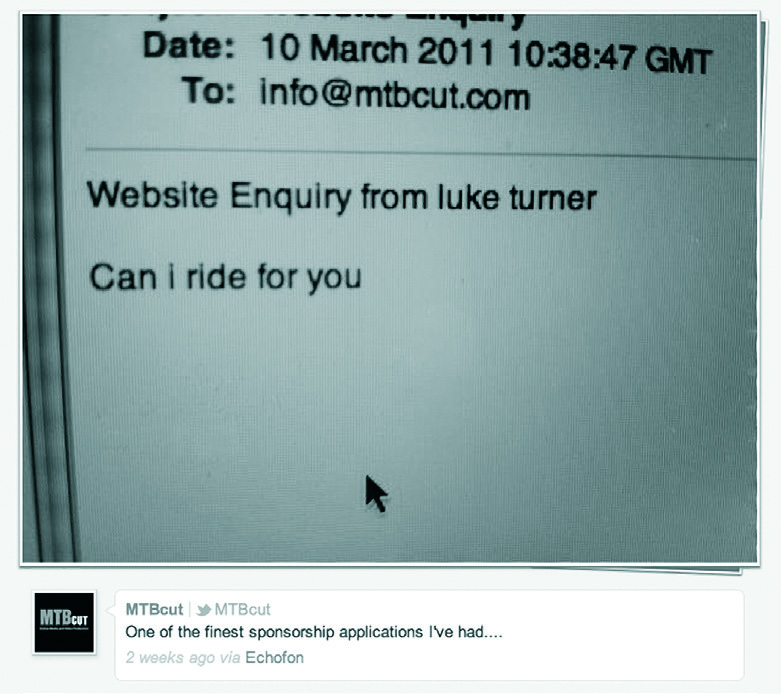“Can I ride for you?” Yes, excellent, we’re happy to have you, just sign here and we’ll send the bikes over. I’d like to know whether MTBcut replied when they got this message, the amount of advice this kid needs would take a whole afternoon to write. Fair play though, at least he’s out riding his bike instead of wasting his life away behind a screen or drinking cider on a street corner. He is also (one would assume) a youngster with no real experience of how the world works, a mountain biking dweeb if you will, all is forgiven.
Moving through the ranks, some DH racers (most enquiries are gravity flavored) begin to see the importance of being personable and forming a better approach, they start to talk to you at races instead of using the keyboard: “I would love to ride for your team; the bike I’m riding now is shit”. Not cool. Pretty much no bike on the circuit is ‘shit’, particularly if you’ve been given a bike, lent it for a race or received a sizable discount on the latest components. If we help you out with kit, are you going to say the same thing about ours? Come on guys, seriously. Those who mistreat their bikes and show no pride in their appearance; walk on by, the most we’ll give you is a complimentary sticker. Not one with our branding on it though, maybe a ‘well done at the dentist’ badge. Looking at some of them, probably not even that…
Let’s not leave the ranting just yet either. When you do get some kind of deal, however paltry that may be, acting grateful is a great way to progress. Sponsorship is a mutual thing and while, in theory it benefits the sponsor through exposure and testing, it can sometimes be much more hassle than it’s worth. If you’ve been given a bike at trade price or had entries paid for, don’t think you’re the most important thing in the day to day running of a business and try to be helpful where you can. Ultimately, employ a modicum of common sense; sponsorship isn’t the same as charity, the company wants something in return and you should want to deliver. Yes, it’s important bike brands and distributors put back into the sport, but there are many ways to do it.
Finally, before you even think about asking for sponsorship, and this point should have come first, make sure you’ve entered at least one race! We don’t want to see a holiday snap of you jumping off that little kicker at the end of Chavannes in Les Gets, it really doesn’t set you apart, even if you do a shapely turn-bar! Don’t exaggerate results either; there’s a great resource documenting your ‘success’, if you’re average then improve on it and just have fun on your bike. Sponsors aren’t necessarily looking for someone who wins every round; often it’s just an ambassador, someone well known on the scene who’s simply a nice guy or girl. Results aren’t the only thing that makes you a star, if you give back to the sport and have a good relationship with the filmmakers, magazines and websites, you’re who we’re looking for. Controversial one I know, but lose the flat-peaked baseball cap and for goodness sake, untuck your ears.
An incidental snippet in the day-to-day decisions of a bike brand this may be, but hopefully this ramble gives you an idea of another facet to our work. Scoff as you may, sponsorship isn’t always easy and the politics can be awkward or complicated, but it is one of the most exciting and rewarding parts of the job. Seeing kids rise through the ranks supported by parents, then a shop, then a bike brand, it’s fantastic being a stepping-stone in the career trajectory of any downhiller, the same with XC, cyclocross and road. Racing is what got many of us into the jobs we do, and no matter what your opinion, it continues to be the attraction for many.
Downhill is seen as a brand builder for the high-end bike companies; a way for them to gain image in the marketplace. Look at the brands popping up, invariably the majority start ‘marketing’ through DH, with things changing slightly as endurance events come to the fore. What’s the result of all this? Most of the fast kids on the scene haven’t bought their bikes, even the average ones get good deals from a distributor or bike shop wanting to make their stake on getting attention. Another obvious point, just because a bike does well or seems reliable (in the right hands they all fly) the difficulty is getting riders coherent and attuned enough to tell you how it would fly faster. Development is incredibly important and does filter through the range, but the return never warrants the expenditure. Consider the amount spent on riders, travel and kit, then think of the ridiculously small quantity sold, half of which leave the building discounted to grass-roots style riders or shop staff.
A race team is great but it’s not about the bike, it’s the bigger picture that counts, an intricate web where you can fill in the rest of the gaps yourself. One thing to never forget, whatever the politics or motivation for sponsoring a team or attending events, it’s always about being part of this great scene we call mountain biking.
Who are the heroes in all of this? Everyone who takes part in whatever guise, giving their weekends to marshal, chauffeur kids, save to fund their passion, anyone who cares. What makes any kind of biking what it is? People.
Making a living is just a bonus for the best…
